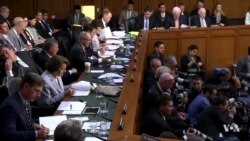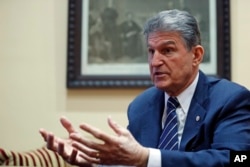Just how extensively Russia penetrated state election systems across America last year and how to prevent a repeat will be the focus of an extensive public hearing by the Senate Intelligence Committee on Wednesday.
"We're trying to focus on all aspects — the aggressive nature of Russia's attempt to hack all the way down to the state level," the committee's chairman, Republican Richard Burr of North Carolina, told VOA.
The panel will hear from cybersecurity and counterintelligence officials at the FBI and the Department of Homeland Security, as well as state election officials and a representative of America's secretaries of state for all 50 states — officials who are tasked with certifying elections.
According to recent media reports, federal investigators now think Russia's penetration of voter rolls and election systems was far more extensive than originally thought, with dozens of U.S. states targeted and potentially compromised in some fashion.
Extent of problem
"I won't comment on the veracity of them [news reports], saying [there were] more than two dozen states the Russians hacked into," said the committee's top Democrat, Mark Warner of Virginia, adding that the American people need to "understand how extensive the Russian efforts were to get into our voting systems.
"I think tomorrow's going to be very interesting," Warner said.
"I want to learn how far they went, what's the likelihood of recurrence, and how do we prevent it," independent Senator Angus King of Maine told VOA. "This is a big deal. We know that they [Russian cyberoperatives] tried to penetrate state elections systems, [voter] registration rolls. This is not a one-off proposition. They weren't doing it for fun — they will be back. We have to do substantially more to secure our system."
Republican Senator James Lankford of Oklahoma agreed.
"Every state should be aware of this because every state is a target," he said. "We want to be able to, obviously, inform people in states of what their vulnerabilities are, what the Russians are actively trying to do. And also make the American people aware of what's happening as well — what they can do, what they can't do, how they're trying to accomplish this."
Different angle
Wednesday's hearing will provide a change of pace from previous weeks, which saw former FBI Director James Comey, Attorney General Jeff Sessions and top U.S. intelligence officials grilled about President Donald Trump's actions and any possible contacts between Russia and members of the president's inner circle. By contrast, the upcoming testimony will delve into the nuts and bolts of securing America's democratic process — the committee's original focus stretching back to last year.
"We've heard pretty extensively in our intel meetings of what has gone on and what attempts and what procedures they used," said Democratic Senator Joe Manchin of West Virginia. "What we're waiting to hear now from the front line, those people on the front line, what effect they saw. Did it have any effect? Did it interrupt any of the outcomes or change any of the outcomes of an election?
"It's very serious," Manchin added. "I'm hoping this [hearing] raises it to an elevation where the American public understands. If you lose faith that the elections are held in a secure manner, that you can trust the outcome of that election, then you are wondering who's controlling the elections and the people that are really governing us."








